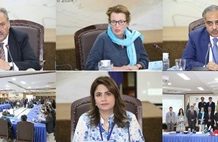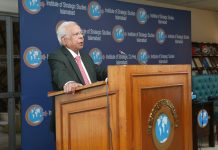“Overview of Pakistan’s Nonproliferation Efforts”,
presentation by Ambassador Tariq Osman Hyder,
former Expert Member Oversight Board for Strategic Export Controls, at the ISSI-SECDIV Seminar on Pakistan’s Nonproliferation Efforts and Strategic Export Control System,
3 May 2016.
Nuclear technology carries with it certain specific responsibilities for safety, security and against diversion and misuse. This responsibility grows exponentially when a country becomes a nuclear power as Pakistan did in 1998.Pakistan has been fully conscious of this responsibility and its efforts have been motivated by the objective of preventing the proliferation of Weapons of Mass destruction. Consistent with its strong commitment to the objectives of disarmament and nonproliferation, Pakistan fully supports appropriate and effective measures to prevent non-state actors from gaining access to weapons of mass destruction and their means of delivery.
This has been reiterated in public policy pronouncements of the Pakistan’s leadership and the government. Nationally, Pakistan has instituted comprehensive administrative, legislative and security measure to ensure the safety and security of sensitive materials, facilities, technologies and equipment. Internationally, Pakistan remains a partner in efforts to stem proliferation and illicit trafficking of WMD-related materials. As the measures put in place by Pakistan have been already described in some detail by preceding speakers, in the short time allocated I will touch on the international efforts of Pakistan in the field of nonproliferation: the guiding principles; active participation in multilateral fora; suitability and readiness to join the four control regimes; and the way forward.
For Pakistan the guiding principle is that the objectives of non-proliferation of weapons of mass destruction can be effectively promoted through freely negotiated, non-discriminatory and cooperative multilateral efforts. Our policy can be best characterized as a constant quest for equity amongst nations, for approaches that do not stand in the way of safeguarded access to nuclear energy for peaceful purposes a right enshrined in the IAEA statutes. Pakistan stands ready to contribute constructively to all efforts that strengthen global non-proliferation within the framework of existing treaty regimes and bodies, and as a partner in the control regimes which should also adopt a non-discriminatory approach and not that of exceptionalism motivated by strategic and commercial interests.
In the UN before we joined the Conference of Disarmament and subsequently in negotiations in the CD and activity in other disarmament related fora and processes including in the UN General First Committee, , IAEA,OPCW, GICNT as well as in bilateral engagements Pakistan has played an active role on nonproliferation issues . I will briefly give two examples.
Though in the negotiations on UNSC 1540 we held that it was not for the Security Council to circumvent the normal procedure of universally negotiated agreements just because they had less control of such a traditional process, we fully participated in the process. Our negotiating mandate as a non permanent member of the Security Council during the finalization of 1540 was to ensure a workable and as fair as it could be outcome which we could sign on to and would not impact our national security. We negotiate hard because we want agreements we can join and when we do we fully live up to them. During the long Iranian nuclear file crisis though we are not an NPT member the first element of our policy and stated public position was that Iran should fulfill its international obligations, pacta sunt servanda.The other elements were that: Iran’s rights( under the NPT and IAEA statutes) must also be respected; we took no position on what shape the final solution should be as were not a party to the negotiations; we urged all parties to strive for a peaceful settlement; and that there must not be any coercion or use of force.
Our next step now in nonproliferation, apart from constantly upgrading our institutions, regulations and practices, is to press home our campaign to join the four control regimes for which we are fully qualified, certainly with nuclear and missile capabilities far advanced than those of many NSG and MTCR members. We can contribute more meaningfully to the global nonproliferation regime as a full partner.
This has been an uphill struggle and likely to remain so. We need to regroup, to examine exiting strategies and processes and to consider what needs to be done to do better.
That we have taken a series of steps is of course clear to all. We need more clarity to project that we undertake these efforts primarily for our own interests not just to earn approval from abroad. Of course, both reinforce each other but we are first and foremost making these efforts in our own self interest as a responsible Nuclear Weapons State (NWS).
While every nuclear state has suffered from mishaps, we should not underestimate however unjustified and unfair that it is now is after all these years, the damaging impact of one mishap . It would therefore take more effort to make our mark at international level given the interplay of politics, commerce and strategic interests in which motivated reasons continues to be used against us.
There is therefore a need for developing coherence in policy formulation and projection at all levels. We continue in the tradition of reacting too cautiously and half halfheartedly to developments that adversely affect global nonproliferation objectives and also our national security . For instance no public or even sufficiently strong bilateral reaction to civil nuclear deals, to the growing supply of conventional weapons and strategic platforms in our neighborhood.
I may mention that for years we brought up the issue of the supply on loan of nuclear attack submarines with unsafeguarded reactors and the transfer of that technology from one NWS to another country in the region. But the western NWS, their allies and the IAEA took the position that this was consistent with the NPT. We should have learnt from this and should try to emulate this example.
Internally policy coordination and its projection is less than optimal. There is a need to supplement it at think tanks, select media, academia, not just inside but abroad as well. Nothing prevents us from organizing more seminars and conferences even at a modest level as indeed this one. Though capacity is being built up and finds support we can do better on this score . Policy research is not a priority, almost alien in our system in which we are beset by dealing with day to day situations, with firefighting. Policy planning may be taking place but it is certainly not yet of the quality that its projection can attract an international audience. Lack of contact between academia and Think Tanks on one side and government officials and departments on the other side is one cause apart from insufficient resources but there is also a lack on initiative on both sides which does not require resources to overcome.
Unlike the military in the Foreign Office disarmament and arms control structure there is a lack of human resources capacity in terms of personnel and their placement. This lean cadre should be expanded and trained officers in whom so much has been invested should not be permitted always to work at their will in other capacities. It is unrealistic to expect to project our narrative with inadequate capacity.
In some cases we need more rigor, to give one example in filing our 1540 reports we must ensure that they are of the same standard as those we submitted before which at one time were held up as an example for other reporting states. Discussions on how to strengthen the Oversight Board as well as SECDIV should be welcomed.
Most important we need to more seriously campaign for membership of the NSG and also for the MTCR A formal applications needs to be made to the MTCR considering that we conveyed to that regime in 2006 our interest in joining, We must not permit a situation to develop which would exclude us permanently from that regime. We have many issues of interest in common with many control regime members and need to approach them all bilaterally more actively in capitals abroad and in Islamabad and if need be to send special envoys. Many of these countries have vital interests that they expect us to understand and often assist in, and in turn we should have no reticence in doing the same. We need to focus on NSG and MTCR membership and in such a campaign we need all hands on deck.
At the same time our quest for equity, our principled consistent stand that nonproliferation should not affect the right of countries to access the full range of peaceful uses of nuclear energy including safeguarded power generation often vital for energy security should be given more practical shape. At a recent OIC seminar in Islamabad the need of many countries for assistance in nuclear related aspects, for oncology and health, for agricultural research and productivity, for water shortage management and for scientific and technical education and training was highlighted. Pakistan has the capacity to extend assistance and cooperation in these fields.
At the 2014 Nuclear Security Summit Prime Minister Nawaz Sharif’s national statement inter alia stressed that Pakistan has been running a safe, secure and safeguarded civil nuclear programme for more than forty years, has the expertise, manpower and infrastructure to produce civil nuclear energy and with the experience and expertise it has gained in the areas of nuclear power generation, non-power application of nuclear technology,nuclear security and safety, under the auspices of the IAEA Pakistan is well placed to assist interested states and also to provide nuclear fuel cycle services under IAEA safeguards .
Safeguarded nuclear power generation may be in retreat in a few countries but not in many others including in our region, in the Gulf and beyond. Pakistan has both the capacity and trained manpower to both assist trilaterally in skilled manpower and construction of nuclear power projects in the Gulf countries and to also to provide a training base in the fundamental sciences, nuclear regulation, nuclear safety and security and reactor operation so that for these countries and other countries its not a black box technology that is brought in by foreign suppliers but becomes a technology that they can more quickly partner and take full responsibility for. To my mind we have the capacity to produce and export research reactors and should be working towards modest size power reactors which are more suitable in many cases.
In the field of nuclear energy and its peaceful and safeguarded applications working with the OIC and the IAEA we should make Pakistan a resource centre, a modern day Al-Andalus in our region.This we should do for our own development and as a service to the developing countries. At the same time our consequent growing relevance will be another reason for the control regimes to include Pakistan in the common task of strengthening the global nonproliferation structure.













